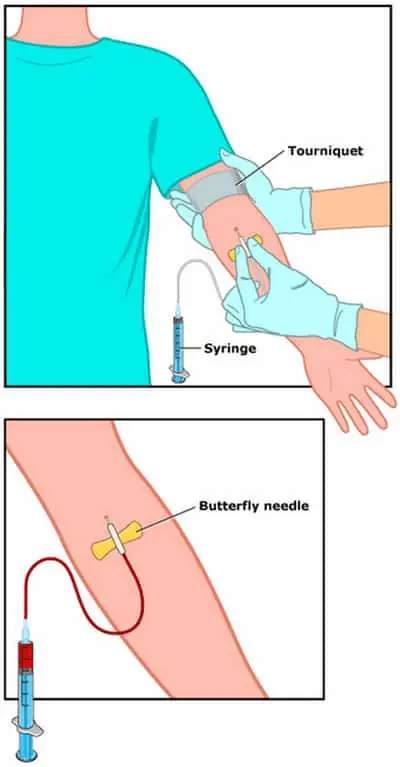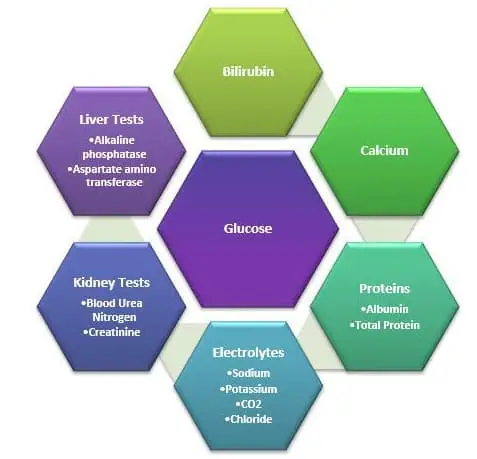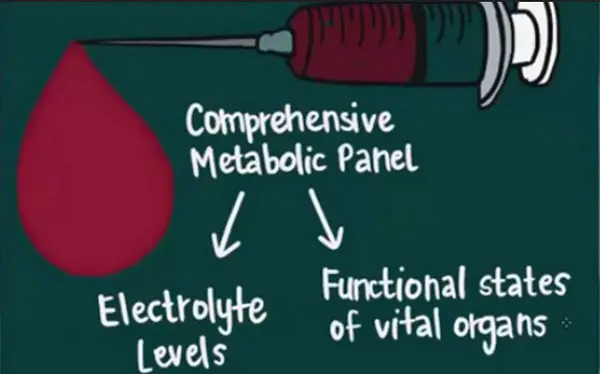What is a CMP Test?
CMP stands for a comprehensive metabolic panel. It is a part of a broad screening procedure that aims to evaluate the function of essential organs in the body.
Through the CMP test, the health of the kidneys, liver, and electrolyte and acid-base balance can be checked. It also helps detect the level of glucose and protein in the blood.
The result will help in determining liver and kidney-related diseases as well as hypertension. (1, 2)

Picture 1: The image shows how a CMP test is performed using the usual blood test. A blood is drawn from the arm using a sterile technique.
Image source: connecticutchildrens.org

Picture 2: A comprehensive metabolic panel test is also known as a chemistry screen or chemistry panel.
Image source: auroralifescience.com
Why is a CMP test done?
A CMP test is ordered to help the doctor in identifying important information about your current health condition, especially the kidneys and liver.
It is also ordered in people who are taking medications that might affect the kidneys and liver. (1)
When is a CMP test ordered?
A CMP test is a routine health exam. It is ordered if you are monitored for a specific condition and/or taking medications that may affect the liver and the kidneys.
Since it is a routine test, it does not mean that it is a confirmatory exam. If there is something wrong in the CMP test result, the doctor will order another test to confirm and/or rule out the diagnosis. (2, 3)

Picture 3: A CMP test measures the functions of vital organs of the body, especially the kidneys and liver.
Image source: healthresearchfunding.org
How is the CMP test performed?
Blood sample is drawn from the vein in the arm. Do I have to fast for a CMP blood test? Prior to the CMP test, you should fast for about 12 hours. You cannot take anything by mouth except water.
There might be some special instructions from your doctor depending on the reason why the test is done. (3, 4, and 5)
How long does a CMP test take?
It will only take a few minutes to complete the test. A blood is drawn just like the routine complete blood count (CBC) test. If the vein is visible, then the test is done in less than two minutes.
However, there are instances when the health professional will make several attempts, especially in patients with a hard to find vein such as overweight or obese patients. (4, 5)
What is included in a CMP lab test?
The comprehensive metabolic panel is a panel of 14 tests that is helpful for the doctor as it gives important information about the patient’s current state of health particularly the condition of the kidneys, liver, electrolytes, blood proteins, and blood glucose. A significant part of the CMP test include the following:
- Calcium – A mineral in the body needed for the muscles, nerves, and heart to function properly. Calcium aids in bone formation and blood clotting.
- Glucose – It serves as the source of energy of the body. It is important to have a steady supply of glucose and should be maintained at a healthy level.
- Proteins
- Albumin – It is a type of protein produced by the liver, which also serves as the primary protein in serum.
- Total protein – It measures the level of albumin and other proteins found in serum.
- Electrolytes
- Sodium – It is involved in various bodily functions specifically the functions of the nerves and muscles.
- Potassium – It is involved in cellular metabolism and also used in various functions of the muscles.
- Chloride – it regulates the amount of fluid in the body and at the same time helps maintain acid-base balance.
- Carbon dioxide – It regulates acid-base balance.
- Kidney test
- Creatinine – it is a waste product produced in the muscles. The kidneys are the ones that filter creatinine out of the blood. It is important to eliminate creatinine for the kidneys to function properly.
- BUN (blood, urea, nitrogen) – It is also a waste product that is filtered by the kidneys. A high BUN indicates possible kidney disease.
- Liver test
- Alkaline phosphatase (ALP) – It is a type of enzyme found in various parts of the body, specifically in the liver and bone. If the level of alkaline phosphatase is high, it could indicate a possible liver or bone-related disease.
- Alanine aminotransferase (ALT/SGOT) – It is an enzyme present in the kidneys and liver. It is measured to detect the presence of liver disease and liver damage.
- Aspartate aminotransferase (AST) – It is an enzyme found in the liver and heart and its level is checked to detect liver damage.
- Bilirubin – The liver breaks down and recycles aged red blood cells. As a result, it produces a waste product called bilirubin. (4, 5, 6, 7, and 8)
CMP blood test results explained
The results of various parameters in the CMP test are evaluated together to check for any abnormalities. Usually, if the patient is hospitalized, the doctor will order several sets of CMP test on different days to thoroughly check any abnormalities, assess underlying health conditions, and check for its response to treatment.
If the result is out of range, then a follow-up test should be performed to accurately diagnose the condition of the patient. (9, 10)
What is the difference between a CMP and a BMP?
The primary difference between a CMP and BMP is that the former consists of 14 tests while the latter is a subset of CMP and only consists of eight tests.
The doctor prefers CMP over BMP, especially if he/she wants to know more about the functions and conditions of your organ or want to check for a specific condition such as kidney disease, liver disease, and diabetes. (3, 6, and 7)
What to keep in mind?
The result of the components of a CMP test can be affected by the patient’s intake of over the counter drugs and prescription medications. If you are taking any types of medication, you should inform your doctor prior to the test.
Many other factors can affect the result. Which is why it is important to inform your doctor ahead of time, especially if you have an existing medical condition.
It is also important to fast for about 10 to 12 hours prior to the procedure. (2, 7, and 8)
References
- https://labtestsonline.org/tests/comprehensive-metabolic-panel-cmp
- https://www.webmd.com/a-to-z-guides/comprehensive-metabolic-panel
- https://kidshealth.org/en/parents/blood-test-cmp.html
- https://www.healthlabs.com/comprehensive-metabolic-panel-cmp-testing
- https://www.healthline.com/health/cmp-vs-bmp
- https://www.connecticutchildrens.org/health-library/en/parents/blood-test-cmp/
- https://www.verywellhealth.com/what-is-a-comprehensive-metabolic-panel-2860812
- https://medlineplus.gov/ency/article/003468.htm
- https://en.wikipedia.org/wiki/Comprehensive_metabolic_panel
- https://www.walkinlab.com/labcorp-complete-comprehensive-metabolic-panel-cmp-14-blood-test.html
